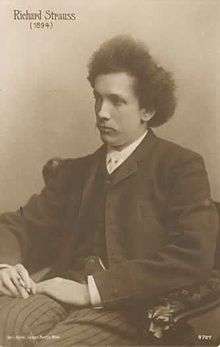Morgen!
| Morgen! | |
|---|---|
| Lied by Richard Strauss | |
 Strauss in 1894 | |
| English | "Tomorrow!" |
| Key | G major |
| Catalogue | Op. 27/4, TrV 170 |
| Text | Poem by John Henry Mackay |
| Language | German |
| Composed | 1894 |
| Dedication | Pauline de Ahna |
| Scoring | Voice and piano |
"Morgen!" ("Tomorrow!") is the last in a set of four songs composed in 1894 by the German composer Richard Strauss. It is designated Opus 27, Number 4.
The German love poem "Morgen!" which is the text of the song was written by Strauss's contemporary, John Henry Mackay, who was of partly Scottish descent but brought up in Germany.
History
Strauss had met Mackay in Berlin, and set Morgen! to music on 21 May 1894. It was one of his four Lieder Opus 27, a wedding present to his wife Pauline. Initially, he set the accompaniment for piano alone, and for piano with violin. In 1897 he arranged the piece for orchestra with violin solo.
"Morgen!" remains one of Strauss's best-known and most widely recorded works. Strauss himself recorded it in 1919 accompanying the tenor Robert Hutt on the piano,[1] and again in 1941 conducting the orchestral version with tenor Julius Patzak and the Bavarian State Orchestra.[2] His last recording of it was 11 June 1947, a live broadcast on radio with Strauss conducting the Orchestra della Svizzera Italiana and soprano Annette Brun.[3]
Instrumentation of accompaniment
Strauss wrote the song originally to be accompanied by piano. In 1897 he orchestrated the accompaniment for orchestral strings plus a solo violin, a harp, and three horns. The orchestral strings are muted, and the dynamic throughout is pianissimo or softer. The harp, playing arpeggios, and the solo violin accompany continuously, and the horns do not play until the last few bars when the violin pauses before ending with an ascending phrase. The last chord is joined by a solo horn.[4]
Text
|
The poem, with minor changes by Strauss, reads as follows:
|
Literal translation:
|
|
Poetic English translation:
|
English edition by John Bernhoff, 1925 Universal-Edition:
|
A translation which is as close as possible to the original German, but adapted to flow in English:
- And tomorrow the sun will shine again
- And on the way which I shall follow
- She will again unite us lucky ones
- As all around us the earth breathes in the sun
- Slowly, silently, we will climb down
- To the wide beach and the blue waves
- In silence, we will look in each other's eyes
- And the mute stillness of happiness will sink upon us
Opus 27
The other three songs of Strauss's Opus 27 are:
- Op. 27 No. 1 "Ruhe, meine Seele!" (Nicht ein Lüftchen regt sich leise)
- Op. 27 No. 2 "Cäcilie" (Wenn du es wüßtest)
- Op. 27 No. 3 "Heimliche Aufforderung" (Auf, hebe die funkelnde Schale)
References and notes
- ↑ Richard Strauss conducts Richard Strauss, Symposium 1225.
- ↑ Patzak (Strauss)
- ↑ CD Richard Strauss: Duett Concertino and Der Burger als Edelmann, Orchestra della Svizzera Italiana, CPO 7779902 (Bonus track 14).
- ↑ Richard Strauss Lieder, Complete Edition Vol. IV, London, 1965, Boosey & Hawkes
- ↑ In line 3 Strauss replaced Mackay's "Seligen" with "Glücklichen"
- ↑ In the last line Strauss replaced Mackay's "großes" with "stummes"